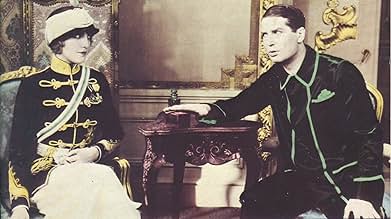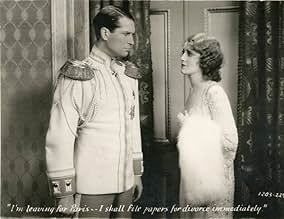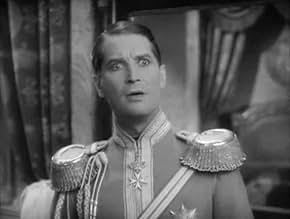VALUTAZIONE IMDb
7,0/10
2787
LA TUA VALUTAZIONE
Aggiungi una trama nella tua linguaThe queen of mythical Sylvania marries a courtier, who finds his new life unsatisfying.The queen of mythical Sylvania marries a courtier, who finds his new life unsatisfying.The queen of mythical Sylvania marries a courtier, who finds his new life unsatisfying.
- Regia
- Sceneggiatura
- Star
- Candidato a 6 Oscar
- 4 vittorie e 6 candidature totali
Carl Stockdale
- The Admiral
- (as Carlton Stockdale)
Albert De Winton
- Cabinet Minister
- (as Albert de Winton)
Recensioni in evidenza
Poor Queen Louise when she is awakened by her attendants she has been dreaming of love but must face another day in the Kingdom of Sylvania without a husband. When an errant military adjutant is recalled from Paris to face her censure she falls for his charms and he for hers, and they marry. But the Queen's new husband is unhappy in the role of obedient consort. Conflict arises but is eventually resolved, as we know it will be in operetta land.
This early Lubitsch musical rates about the same as MONTE CARLO made a year later. The highlight here is the performance of Maurice Chevalier as the consort, a sort of pre-Cary Grant Cary Grant, Gallic style. He has the same effortless magnetism and charm and a certain physical resemblance. Jeanette MacDonald is as good here as in MONTE CARLO, handling songs and dialogue with equal aplomb and looking gorgeous in her filmy gowns. As is usual with Lubitsch, there is a superior supporting cast, here including the formidable Lupino Lane as Chevalier's valet, a sassy and brassy Lillian Roth as Lane's love interest and Edgar Norton as the "Master of Ceremonies," the personification of royal lackey. Another Lubitsch hallmark, the measured depiction of ritualistic daily activities, gets much display in the context of the protocols of a royal palace. The songs by Victor Schertzinger and Clifford Grey are only passable and the primitive sound recording doesn't help in getting them across but the tone of the whole enterprise is so frothy and pleasant that one doesn't mind not hearing all of the lyrics.
When you compare this film to other musicals from the dawn of the sound era like Broadway MELODY the difference is glaring. Lubitsch's camera is liberated and fluid and we get an assortment of physical approaches to song and dance numbers which themselves vary in style from pompous operetta-military to musical hall slapstick to Gilbert-and- Sullivanesque call-and-repeat choral to intimate romantic duets. There is a hint of LOVE ME TONIGHT in some of the ensemble work, particularly with the palace staff. And the script is studded with witty observations and clever comic constructions, some via dialogue, some through pure visuals. THE LOVE PARADE illustrates that in 1929 Rouben Mamoulian (APPLAUSE) was not alone among film directors in recognizing the value of sound as an artistic element and in refusing to subordinate the freedom of the camera to the dictates of miking.
This early Lubitsch musical rates about the same as MONTE CARLO made a year later. The highlight here is the performance of Maurice Chevalier as the consort, a sort of pre-Cary Grant Cary Grant, Gallic style. He has the same effortless magnetism and charm and a certain physical resemblance. Jeanette MacDonald is as good here as in MONTE CARLO, handling songs and dialogue with equal aplomb and looking gorgeous in her filmy gowns. As is usual with Lubitsch, there is a superior supporting cast, here including the formidable Lupino Lane as Chevalier's valet, a sassy and brassy Lillian Roth as Lane's love interest and Edgar Norton as the "Master of Ceremonies," the personification of royal lackey. Another Lubitsch hallmark, the measured depiction of ritualistic daily activities, gets much display in the context of the protocols of a royal palace. The songs by Victor Schertzinger and Clifford Grey are only passable and the primitive sound recording doesn't help in getting them across but the tone of the whole enterprise is so frothy and pleasant that one doesn't mind not hearing all of the lyrics.
When you compare this film to other musicals from the dawn of the sound era like Broadway MELODY the difference is glaring. Lubitsch's camera is liberated and fluid and we get an assortment of physical approaches to song and dance numbers which themselves vary in style from pompous operetta-military to musical hall slapstick to Gilbert-and- Sullivanesque call-and-repeat choral to intimate romantic duets. There is a hint of LOVE ME TONIGHT in some of the ensemble work, particularly with the palace staff. And the script is studded with witty observations and clever comic constructions, some via dialogue, some through pure visuals. THE LOVE PARADE illustrates that in 1929 Rouben Mamoulian (APPLAUSE) was not alone among film directors in recognizing the value of sound as an artistic element and in refusing to subordinate the freedom of the camera to the dictates of miking.
This is very much like a Vienese operetta, with its principle couple - Chevalier and MacDonald - and its second couple, the help, who mirror the principle couple in a light way. The music often sounds like minor Johann Strauss or early Lehar, and the plot owes a lot to The Merry Widow.
Still, my favorite aspect of this movie is that, being pre-code, it constantly flirts with the edge of what could be dared in those days. It's never in any way obscene or vulgar, but it's constantly winking at the audience about matters sexual, and of course the last shot is of the couple in bed - one bed. Hollywood wouldn't enjoy that freedom for another 30 years.
It's all very light and, in the end, not very memorable, but along with One Hour with You, which I probably prefer, a very enjoyable way to spend an evening.
Still, my favorite aspect of this movie is that, being pre-code, it constantly flirts with the edge of what could be dared in those days. It's never in any way obscene or vulgar, but it's constantly winking at the audience about matters sexual, and of course the last shot is of the couple in bed - one bed. Hollywood wouldn't enjoy that freedom for another 30 years.
It's all very light and, in the end, not very memorable, but along with One Hour with You, which I probably prefer, a very enjoyable way to spend an evening.
"Anything for the Queen" will be my new motto around the household, specifically for my bf. It is good to see that you can learn something from 82+ years ago for the first time.
I've always been a fan of 30's musicals so it was a treat to see this movie for the first time of my life as a historical piece, but also to see the development of musical movies from the start. I am blessed to live within 30 miles of the Stanford Theater in Palo Alto, CA that offers amazing film histories, museum and revivals every week of the year.
I can now see why Chevalier was such a hit -- he had natural wit, humor and timing, something I never witnessed in later films (such as Gigi) where his talents were mostly condensed down to singing.
Jeanette McDonald's operatic singing was extraordinary, but does feel "dated" in the film in contrast to the impeccable performances, timing, dance and humor-filled vaudevillian routines of Lupino Lane and Lillian Roth. IMO they stole the show (sort of like a 'Jack & Karen' team did from "Will & Grace").
I would see the movie again just to check out the servant scenes and a well-deserved nod to the animal trainer for the dog performances. The entire cinema was laughing at the opening goodbye to Paris scene.
I've always been a fan of 30's musicals so it was a treat to see this movie for the first time of my life as a historical piece, but also to see the development of musical movies from the start. I am blessed to live within 30 miles of the Stanford Theater in Palo Alto, CA that offers amazing film histories, museum and revivals every week of the year.
I can now see why Chevalier was such a hit -- he had natural wit, humor and timing, something I never witnessed in later films (such as Gigi) where his talents were mostly condensed down to singing.
Jeanette McDonald's operatic singing was extraordinary, but does feel "dated" in the film in contrast to the impeccable performances, timing, dance and humor-filled vaudevillian routines of Lupino Lane and Lillian Roth. IMO they stole the show (sort of like a 'Jack & Karen' team did from "Will & Grace").
I would see the movie again just to check out the servant scenes and a well-deserved nod to the animal trainer for the dog performances. The entire cinema was laughing at the opening goodbye to Paris scene.
Count Alfred (Maurice Chevalier) has disgraced his home country of Sylvania with one too many scandalous affairs with married women, and the ambassador of Sylvania commands him to return home. Alfred's manservant, Jacques (Lupino Lane), begs to come along, and his master relents. Alfred, burdened with a newly acquired French accent that makes him sound most un-Sylvanian, fears the wrath of his queen (Jeanette MacDonald). But instead of having him shot, she falls in love with him, and he with her. The entire kingdom, which has had nothing on its mind except seeing the queen get married, is thrilled. As Jacques and Lulu the maid (Lillian Roth) conduct their own romance, reveling in their commonness, Alfred discovers at the altar that his own marriage will be most uncommon - and a dire threat to his manhood. He may be marrying a queen, but he most definitely won't be a king.
Ernst Lubitsch directed this marvelous technical and artistic achievement back when other early sound films were still stumbling along. Four outstanding performances from four witty and charming performers (Chevalier, MacDonald, Lane and Roth) grace this lavishly produced musical comedy with its champagne-bubble songs and sexually-charged dialogue.
Ernst Lubitsch directed this marvelous technical and artistic achievement back when other early sound films were still stumbling along. Four outstanding performances from four witty and charming performers (Chevalier, MacDonald, Lane and Roth) grace this lavishly produced musical comedy with its champagne-bubble songs and sexually-charged dialogue.
An early musical (Ernst Lubitsch's first talkie), so the sound can be hard on the ears (especially Jeanette MacDonald's high notes). The plot as such is forgettable, but see it for the performances.
It seems odd to match Jeanette MacDonald's operetta singing with Maurice Chevalier's cabaret, but each gets their own numbers and they join in the middle for duets.
Lupino Lane and Lillian Roth do two wonderful vaudeville style song and dance numbers.
It seems odd to match Jeanette MacDonald's operetta singing with Maurice Chevalier's cabaret, but each gets their own numbers and they join in the middle for duets.
Lupino Lane and Lillian Roth do two wonderful vaudeville style song and dance numbers.
Lo sapevi?
- QuizConsidered by many to be the first musical film in which the songs were integrated with the story.
- BlooperThe fact that Count Alfred (Maurice Chevalier) speaks with a French accent, even though he is not supposed to be French, is really not an "error". However, by adding a scene to attempt to explain this anomaly, it only serves to highlight the accent discrepancies in the casting. For instance, in contrast to the accent discrepancy with Chevalier's character, no one seems to notice that his French servant, Jacques (Lupino Lane), speaks British English with no discernible French accent.
- Citazioni
Queen Louise: Why am I always awakened from my dreams?
- Versioni alternativeThere is an Italian edition of this film on DVD, distributed by DNA Srl: "IL PRINCIPE CONSORTE (1929) + AMAMI STANOTTE (1932)" (2 Films on a single DVD), re-edited with the contribution of film historian Riccardo Cusin. This version is also available for streaming on some platforms.
- ConnessioniFeatured in Le Dee dell'amore (1965)
I più visti
Accedi per valutare e creare un elenco di titoli salvati per ottenere consigli personalizzati
- How long is The Love Parade?Powered by Alexa
Dettagli
- Data di uscita
- Paese di origine
- Lingue
- Celebre anche come
- The Love Parade
- Luoghi delle riprese
- Azienda produttrice
- Vedi altri crediti dell’azienda su IMDbPro
Botteghino
- Budget
- 650.000 USD (previsto)
- Tempo di esecuzione
- 1h 47min(107 min)
- Colore
Contribuisci a questa pagina
Suggerisci una modifica o aggiungi i contenuti mancanti






















